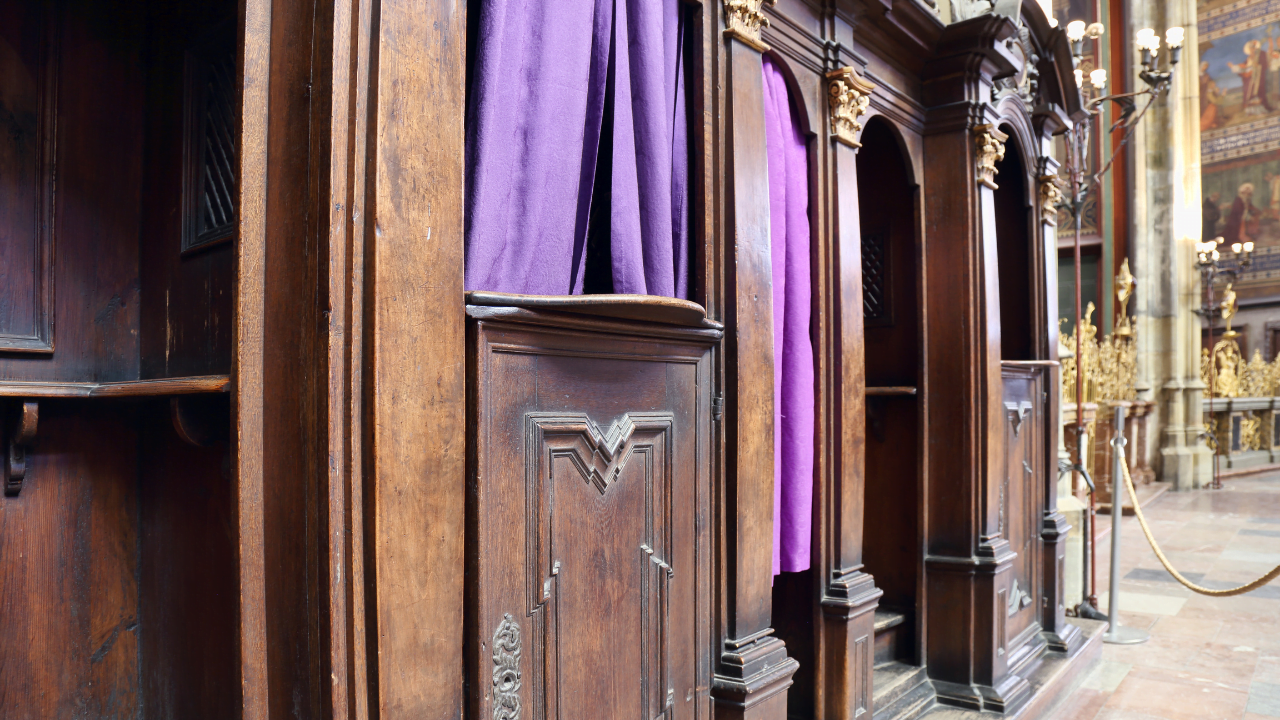No products in the cart.
What Is The Meaning of Reconciliation in Catholicism
ADVERTISEMENT
This post contains paid and/or affiliate links. I make a small commission at no extra cost to you. Please see our Privacy Policy.
Reconciliation is an important concept in Catholicism, representing the process of healing and restoring a relationship with God. It is viewed as a sacred sacrament through which Catholics seek forgiveness for their sins and reconcile with God and the Church. Reconciliation plays a crucial role in the spiritual journey of Catholics, offering them the opportunity to experience spiritual healing and renewal.
In Catholicism, reconciliation is seen as a means to restore a damaged relationship with God, believed to occur through forgiving sins. Catholics believe that sins separate them from God and disrupt the harmony of their relationship with Him. Through the sacrament of reconciliation, they seek God’s forgiveness and strive to rebuild their relationship.
The sacrament of reconciliation is also known as confession or penance. It involves confessing one’s sins to a priest representing God and the Church. The priest provides spiritual guidance, counsel, absolution, and a declaration of forgiveness on behalf of God.
Confession is an essential part of the reconciliation process in Catholicism. By openly acknowledging one’s sins and expressing remorse, Catholics are committed to change and seek God’s forgiveness. Confession allows individuals to reflect on their actions, take responsibility for their sins, and receive guidance on how to live a more faithful and virtuous life.
In Catholic teaching, forgiveness is a central component of the reconciliation process. Through confession and the sacrament of reconciliation, Catholics are forgiven by God and challenged to forgive others. This emphasis on forgiveness reflects the teachings of Jesus, who emphasized the transformative power of forgiveness and the importance of reconciliation with others.
Reconciliation in Catholicism is not limited to individual repentance. It is also an integral part of the wider community’s spiritual journey. The reconciliation process extends beyond personal relationships with God, including reconciliation with the Church and the community. By seeking reconciliation with the Church, Catholics strive to restore their relationship with the broader faith community and reaffirm their commitment to the teachings and values of Catholicism.
ADVERTISEMENT
Reconciliation holds significant meaning in Catholicism. It represents the healing, forgiveness, and restoration of a relationship with God. Through confession and the sacrament of reconciliation, Catholics seek forgiveness for their sins, strive to reconcile with God, and restore their relationship with the Church and the wider faith community.
The Sacrament of Reconciliation: A Path to Spiritual Healing
The Sacrament of Reconciliation, also known as Confession or Penance, holds a significant place in the Catholic faith. It is a sacred ritual that offers believers spiritual healing, forgiveness, and reconciliation with God and the community. This sacrament is crucial in the Catholic Church’s teachings on redemption and the importance of individual repentance.
Reconciliation in the Catholic context refers to seeking forgiveness for sins committed and restoring one’s relationship with God and others. It is based on the belief that human beings are prone to sin and require divine mercy and grace to achieve spiritual restoration. Through the sacrament of Reconciliation, Catholics are called to examine their conscience, confess their sins, express genuine remorse, receive absolution, and perform acts of penance.
The journey of reconciliation begins with a sincere examination of conscience. This involves introspection and reflection on one’s thoughts, words, and actions. Catholics are encouraged to evaluate their lives in light of God’s commandments and identify areas where they have fallen short. This process enables them to develop a deeper self-awareness and recognize the need for forgiveness and healing.
Confession is integral to the sacrament, wherein the individual confesses their sins to a priest. Confessing allows for a humble acknowledgment of wrongdoing and facilitates the healing process. The priest serves as a representative of God and the community, offering guidance, compassion, and counsel to the penitent. The seal of confession ensures the confidentiality of the confession, providing a safe and trusting environment for the penitent to unload their burdens.
Genuine repentance is essential in the reconciliation process. It involves feeling remorse for one’s sins and a sincere desire to change. Catholics are encouraged to express their remorse through heartfelt prayers and a firm commitment to avoiding future sin. This repentance opens the door to receiving God’s forgiveness and experiencing spiritual healing.
Absolution, the formal forgiveness of sins by the priest, is a pivotal moment in the sacrament. Through the words of absolution, the priest assures the penitent of God’s mercy and grants forgiveness on behalf of the Church. This act brings about the reconciliation of the penitent with God and the Church, restoring the individual to a state of grace and communion.
Acts of penance serve as a sign of repentance and a means of spiritual growth. The penitent is assigned a specific penance, such as prayer, fasting, or acts of charity, intended to foster a more profound conversion of heart and a commitment to living a more righteous life. These acts of penance help individuals integrate the grace received in the sacrament into their daily lives.
The Sacrament of Reconciliation is a powerful sacrament that offers Catholics a transformative experience of healing and reconciliation. It allows individuals to seek forgiveness, reconcile with God and others, and receive the grace needed to deepen their spiritual journey. Catholics find solace, mercy, and love through this sacrament, strengthening their relationship with God and fostering unity within the Church.
The Role of Confession in Catholic Reconciliation
The sacrament of reconciliation is significant in the Catholic faith as it allows individuals to seek forgiveness for their sins and reconcile with God. Central to this sacrament is the act of confession, which plays a vital role in the reconciliation process.
ADVERTISEMENT
Confession is a sacred practice in the Catholic Church where a person admits their sins to a priest, who represents God’s forgiveness. Through an open and honest confession, individuals acknowledge their wrongdoings, take responsibility for their actions, and express genuine remorse for their sins.
Confessing one’s sins serves multiple purposes within the sacrament of reconciliation. Firstly, it allows individuals to confront their transgressions and face the consequences of their actions. By openly admitting their mistakes, individuals demonstrate humility and a willingness to seek forgiveness. This process fosters personal growth and self-reflection, leading to a deeper understanding of one’s actions and impact on others.
Confession also serves as a means of accountability. When individuals confess their sins to a priest, they accept the guidance and counsel offered by the Church. The priest, bound by the seal of confession, provides spiritual guidance and offers advice on avoiding future sins. Through this process, individuals are held accountable for their actions and encouraged to make positive life changes.
Furthermore, confession is a powerful tool for healing and reconciliation. By confessing their sins, individuals can experience a sense of relief and liberation from the burden of guilt. Confessing to a priest, who represents Christ’s mercy and compassion, opens the door to forgiveness and reconciliation with God and the Church community.
In the sacrament of reconciliation, the priest acts as an instrument of God’s mercy and forgiveness. After hearing the confession, the priest imparts absolution, granting forgiveness on behalf of God. This absolution reflects the belief that God’s infinite love and mercy can reconcile even the most profound sins. Through the priest’s words, individuals are assured of God’s forgiveness and are invited to embrace a renewed spiritual journey.
Moreover, confession within the sacrament of reconciliation reinforces the importance of community and the interconnectedness of believers. While confession is a personal and intimate encounter with God, it also involves the wider Catholic community. Confession reflects the understanding that our actions have consequences not only on ourselves but also on the community. By seeking forgiveness and reconciliation, individuals strive to restore harmony within themselves and the larger Church community.
Confession plays a pivotal role in the sacrament of reconciliation in the Catholic Church. It enables individuals to confront their sins, seek forgiveness, and reconcile with God and the Church community. Confession provides a path to personal growth, accountability, healing, and spiritual renewal. Catholics can experience the transformative power of God’s mercy and forgiveness by fostering a deeper connection with their faith and community.
The Importance of Forgiveness in the Catholic Reconciliation Process
In the Catholic faith, forgiveness plays a vital role in reconciliation. It is a fundamental aspect of this sacrament, as it allows individuals to restore their relationship with God and the Church. Forgiveness is about seeking pardon for one’s sins and experiencing spiritual healing and growth.
Forgiveness is central to the Catholic faith because it reflects the teachings of Jesus Christ, who emphasized the power of forgiveness. In the Gospel of Matthew, Jesus teaches his followers the importance of forgiving others: “For if you forgive others their trespasses, your heavenly Father will also forgive you.” (Matthew 6:14). This teaching highlights the reciprocal nature of forgiveness in the Catholic tradition.
When Catholics seek reconciliation through the sacrament of Confession, they acknowledge their sins and ask for forgiveness from God. Through the absolution imparted by a priest acting in the person of Christ, they receive God’s forgiveness. This act of forgiveness brings spiritual healing and restores the person’s relationship with God, allowing them to participate in the life of the Church entirely.
Forgiveness in the Catholic reconciliation process is vertical, between the individual and God, and horizontal, involving forgiveness and reconciliation with others. Catholics are called to seek forgiveness from those they have harmed and extend forgiveness to those who have wronged them. This aspect of forgiveness is expressed in the Lord’s Prayer when Jesus teaches his disciples to say, “Forgive us our trespasses as we forgive those who trespass against us.” (Matthew 6:12)
The practice of forgiveness in the Catholic Church extends beyond the sacrament of Reconciliation. It is an integral part of the Christian life and is emphasized throughout various aspects of Catholic teaching. The Catechism of the Catholic Church states, “It is there [in the Lord’s Prayer that] we find the principal ways of obtaining forgiveness: by praying for our enemies, by frequently asking God for pardon, by forgiving from the heart those who have hurt us.” (CCC 2842)
Forgiveness is a transformative process that brings healing, reconciliation, and peace. It allows individuals to experience God’s mercy and love and also enables them to extend that mercy and love to others. By embracing forgiveness, Catholics receive God’s forgiveness and become instruments of reconciliation in the world.
Forgiveness is of utmost importance in the Catholic reconciliation process. It is a core aspect of the sacrament of Confession and reflects the teachings of Jesus Christ. Through forgiveness, individuals seek reconciliation with God and experience spiritual healing.
Furthermore, forgiveness extends beyond personal relationships and encompasses a broader dimension of forgiveness toward others. By embracing forgiveness, Catholics deepen their relationship with God and contribute to building a more compassionate and reconciled world.
The Role of Reconciliation in the Catholic Church: Historical Background and Modern Practices
The sacrament of reconciliation, known as confession or penance, holds significant importance in the Catholic Church. Reconciliation is a spiritual practice that focuses on restoring a harmonious relationship between an individual and God and the community. This sacrament has a rich historical background and continues to play a crucial role in the lives of Catholics today.
In the early centuries of Christianity, reconciliation was considered a public event, where penitents publicly confessed their sins and sought forgiveness from the church community. However, the practice evolved over time, and private confession became more common. The Fourth Lateran Council of 1215 established the obligation of individual confession, making it an integral part of the Catholic Church’s sacramental life.
Advertisement. Scroll to continue reading.
The reconciliation process involves confessing one’s sins to a priest, a mediator between the penitent and God. The priest offers guidance, advice, and absolution, which is the forgiveness granted by God through the priest. This sacrament allows Catholics to reflect on their actions, take responsibility for their sins, and seek God’s mercy and forgiveness.
Reconciliation serves as a powerful means of spiritual healing and growth. Catholics experience God’s love and mercy firsthand through this sacrament, which brings about inner transformation and a restored relationship with the divine. It provides a chance to examine one’s conscience, recognize personal faults, and seek reconciliation with God oneself and others.
Forgiveness plays a vital role in the process of reconciliation. The Catholic Church emphasizes the importance of forgiving others to receive God’s forgiveness. We imitate Christ’s example of love and mercy by forgiving those who wronged us. It allows us to let go of anger, resentment, and bitterness, fostering reconciliation and a deeper understanding of the Catholic faith.
Modern reconciliation practices in the Catholic Church often involve the availability of the sacrament through regular confession times or by appointment with a priest. Some parishes also hold communal reconciliation services during the liturgical seasons of Advent and Lent. The sacrament may be celebrated privately, face-to-face with the priest, or anonymously behind a screen, according to the penitent’s preference.
While reconciliation is deeply personal, it also has communal dimensions. The Catholic Church views sin as not only an individual failing but also something that damages the entire body of Christ. Therefore, reconciliation extends beyond the individual’s relationship with God and encompasses the reconciliation of the community as a whole.
Reconciliation holds great significance in the Catholic Church. Its historical background can be traced back to the early centuries of Christianity, and it continues to be an essential sacrament for Catholics today. Reconciliation offers spiritual healing, growth, and restoring one’s relationship with God and the community. It emphasizes the importance of forgiveness to receive God’s mercy and foster a deeper understanding of the Catholic faith. Catholics seek to cultivate a life of grace, love, and reconciliation through regular participation in the sacrament.
Advertisement. Scroll to continue reading.
ADVERTISEMENT
Conclusion
Reconciliation holds a profound meaning in Catholicism, encompassing the individual spiritual journey and the broader communal aspects of forgiveness and healing. The sacrament of Reconciliation serves as a path to spiritual healing, allowing individuals to seek forgiveness for their sins and restore their relationship with God and the community. Confession is crucial in this sacrament, prompting individuals to examine their conscience, acknowledge their wrongdoings, and express genuine remorse. By confessing their sins to a priest, Catholics receive absolution and invaluable guidance and counseling to help them grow in their faith.
Advertisement. Scroll to continue reading.
Importantly, forgiveness lies at the core of the Catholic reconciliation process. Through forgiveness, individuals experience the transformative power of God’s love and mercy. Forgiving one another cultivates empathy, compassion, and reconciliation within the larger Catholic community. Ultimately, reconciliation seeks to restore harmony, unity, and peace with God and one another. It is a constant call to foster love, understanding, and reconciliation in our relationships.
The practice of reconciliation in the Catholic Church is deeply rooted in history, dating back to the time of Christ. The early Christian community recognized the importance of seeking forgiveness and reconciliation, as demonstrated through the writings of Saint Paul and the early Church Fathers. Over time, the sacrament of Reconciliation evolved, adapting to the changing needs and circumstances of the Church.
In the contemporary Catholic Church, the reconciliation process involves a private confession to a priest, who acts as an intermediary between the individual and God. The priest, bound by the seal of confession, offers guidance, absolution, and appropriate penance to lead the individual toward spiritual healing and renewal.
While the sacrament of Reconciliation is a personal experience, it also reinforces the communal nature of Catholicism, emphasizing the importance of reconciliation within the entire Church community.
Reconciliation holds deep meaning and significance within the Catholic faith. It serves as a pathway to spiritual healing, allowing individuals to seek forgiveness, express remorse, and receive absolution. The sacrament of Reconciliation, through confession, allows individuals to reflect on their actions, receive guidance, and grow in their faith. Forgiveness is fundamental in this process, promoting unity and harmony within the Catholic community.
The historical background and modern reconciliation practices in the Catholic Church highlight its enduring significance as a crucial aspect of the Catholic faith, calling individuals to embrace love, compassion, and reconciliation in their relationships with God and others.
ADVERTISEMENT











